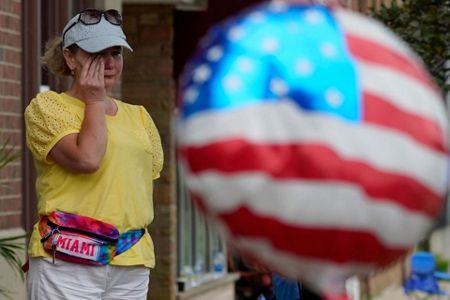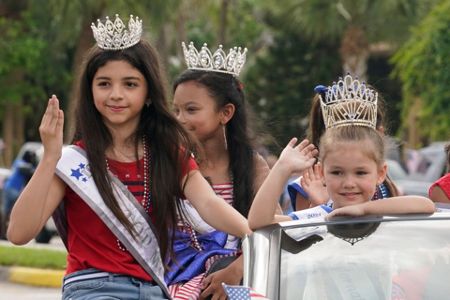A shooting that left at least six people dead at an Independence Day parade in a Chicago suburb rattled Monday's celebrations across the U.S. and further rocked a country already awash in turmoil over high court rulings on abortion and guns as well as hearings on the Jan. 6 insurrection.
The parade in Highland Park began around 10 a.m. but was suddenly halted 10 minutes later after shots were fired. Hundreds of parade-goers — some visibly bloodied — fled the parade route, leaving behind chairs, baby strollers and blankets. Authorities asked residents to shelter in place while they search for the suspect.
“On a day that we came together to celebrate community and freedom, we are instead mourning the tragic loss of life and struggling with the terror that was brought upon us," Highland Park Mayor Nancy Rotering said.
News of yet another mass shooting came as the nation tried to find cause to celebrate its founding and the bonds that still hold it together. It was supposed to be a day for taking off work, flocking to parades, devouring hot dogs and burgers at backyard barbecues and gathering under a canopy of stars and exploding fireworks.
“The Fourth of July is a sacred day in our country — it’s a time to celebrate the goodness of our nation, the only nation on Earth founded based on an idea: that all people are created equal,” President Joe Biden tweeted earlier on Monday. “Make no mistake, our best days still lie ahead.”
These are precarious times: An economic recession lurks, and the Highland Park shooting will weigh on a national psyche already raw from mass shootings like those seen recently at a Texas elementary school and a New York supermarket.
Sharp social and political divisions have also been laid bare by recent Supreme Court decisions overturning the constitutional right to abortion and striking down a New York law limiting who may carry a gun in public.
“Independence Day doesn’t feel like much of a celebration when our basic rights to life, liberty, and the pursuit of happiness are on the chopping block,” New York Attorney General Tish James, a Democrat, tweeted. “Today, I encourage you to imagine what this nation could be if and when we live up to our values.”
However, many had reason to gather and celebrate for the first time in three years amid easing coronavirus precautions.
Nathan’s Famous Fourth of July hot dog eating contest returned to its traditional location in Brooklyn’s Coney Island neighborhood after two years elsewhere thanks to the pandemic.
“It’s beautiful to be back here," Joey “Jaws” Chestnut told ESPN after winning the men's competition by downing 63 hot dogs and buns. Miki Sudo chomped 40 franks to win the women's event.
Colorful displays were scheduled to light up the night sky from New York to Seattle to Chicago to Dallas. However, others, particularly in drought-stricken and wildfire-prone regions of the West, will forgo them.
Fireworks were the suspected cause behind a fire in Centerville, Utah, that led to the evacuation of dozens of homes and the cancellation of some of its Independence Day events, officials said.
It was a different matter in Phoenix, which is again going without fireworks — not because of the pandemic or fire concerns but supply-chain issues.
In emotional ceremonies across the country, some will swear oaths of citizenship, qualifying them to vote in the upcoming midterm elections.
During a ceremony for naturalized citizens held at Mount Vernon, the Virginia home of George Washington, Treasury Secretary Janet Yellen told 52 people originally from 42 different countries that they were essential to building a strong labor force.
“Immigrants strengthen our workforce, and, in the process, help drive the resiliency and vitality of our economy,” Yellen said in remarks prepared for the Monday event.
For many, July 4 was also a chance to set aside political differences and to celebrate unity, reflecting on the revolution that gave rise to history’s longest-living democracy.
“There’s always something to divide or unite us," says Eli Merritt, a political historian at Vanderbilt University whose upcoming book traces the fraught founding of the United States.
But he sees the Jan. 6 hearings probing last year's storming of the U.S. Capitol as a reason for hope, an opportunity to rally behind democratic institutions. Even though not all Americans or their elected representatives agree with the committee's work, Merritt is heartened by the fact that it's at least somewhat bipartisan.
“Moral courage as a locus for Americans to place hope, the willingness to stand up for what is right and true in spite of negative consequences to oneself," he said. "That is an essential glue of constitutional democracy.”
___
Calvan reported from New York, and Foody from Chicago. Associated Press reporters Michael Tarm and Roger Schneider in Highland Park, Illinois, Fatima Hussein in Washington, Stephen Groves in Sioux Falls, South Dakota, Amy Beth Hanson in Helena, Montana, and Jennifer Peltz in New York contributed to this story.
Copyright 2022 The Associated Press. All rights reserved. This material may not be published, broadcast, rewritten or redistributed without permission.






